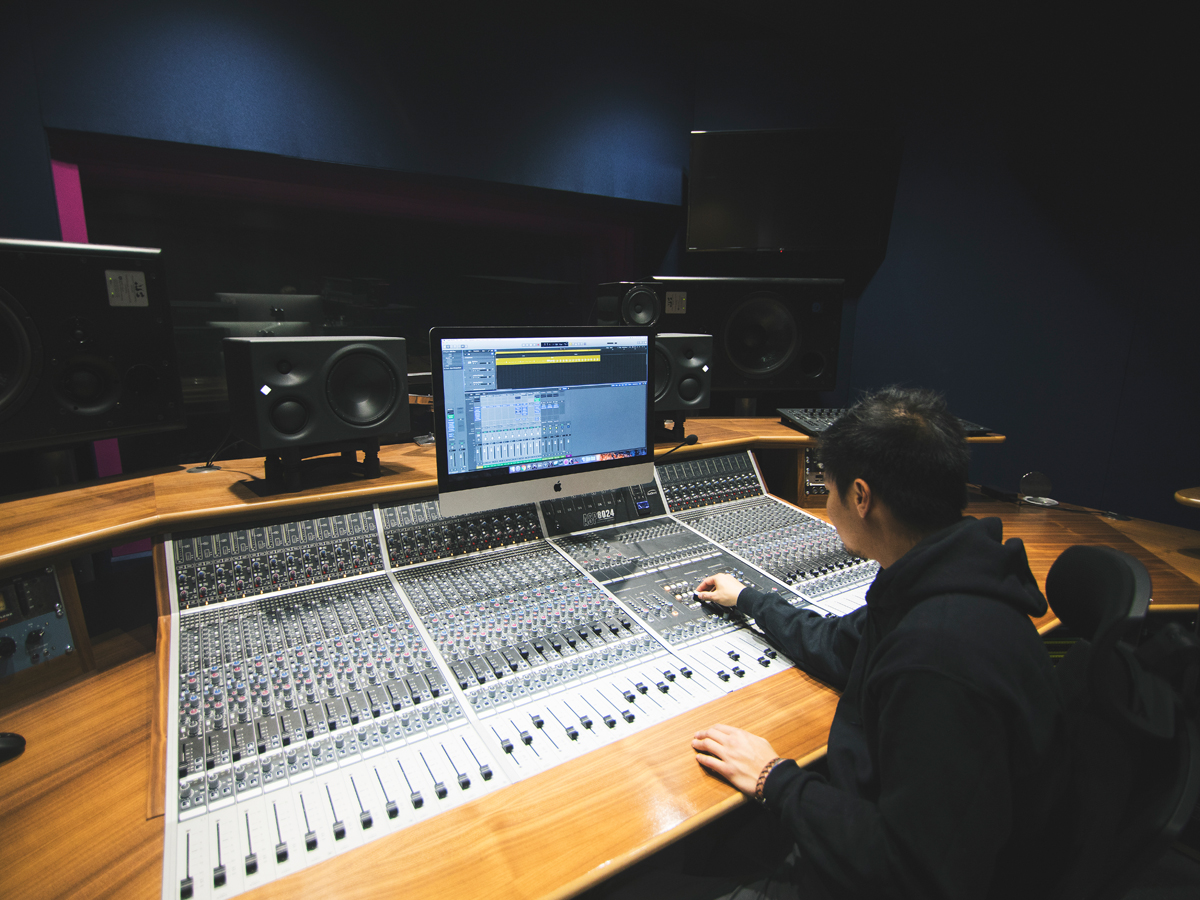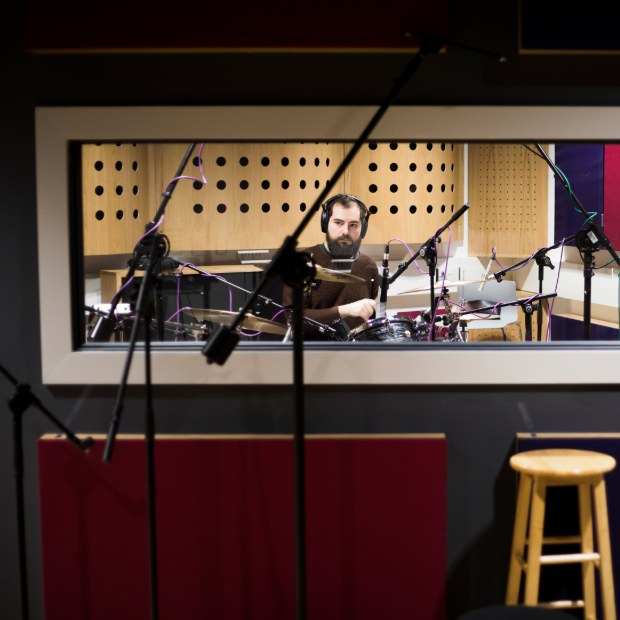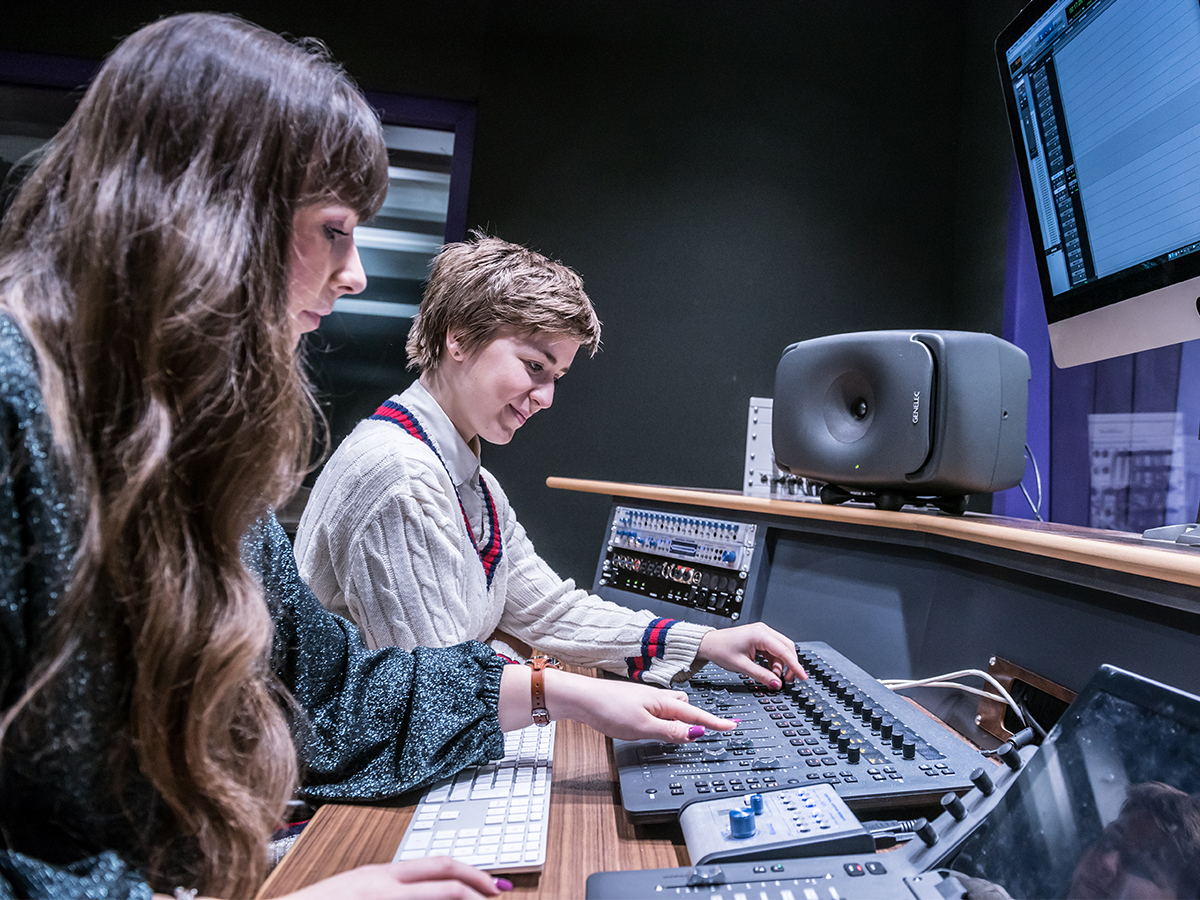Music Clearing
Clearing 2023 is now closed. Find out how to apply to study at the University of Salford and start your course in September 2024.
This page contains more information about our Music Clearing degrees. Learn about what you’ll study and how we’ll prepare you for your future career.
Looking for a music degree that has a reputation for producing graduates that currently work in the music industry? Want to practise music in state-of-the-art facilities and be taught by practising music professionals? Then discover our music clearing degrees.
We’ve designed our music courses to be tailored to you and your specialisms. Whether you have a passion for performing, or want to explore popular music and recording, our bachelor’s degrees in music have you covered.
Music Facilities

When you study a music degree in clearing with us, you’ll call the £55 million New Adelphi building home. It’s where you’ll find state-of-the-art facilities and expert technicians who will help you make the most of your studies. Our full range of music facilities includes:
- Recording Studios – We currently boast six recording studios – all of which are big enough to accommodate both bands and brass ensembles. They contain everything from analogue recording hardware and tape machines to extensive microphone collections, as well as a large selection of drum machines and a diverse array of software platforms.
- Computer Suite – Our 26 work stations are equipped with licences for all of the software we teach. Current software provisions include Logic X, Pro Tools, Ableton, Max MSP, Sibelius and Soundtoys. There is also a huge selection of Universal Audio and Waves plug-ins that are available across all studio spaces.
- Studio 9 Composition Lab – This studio space is equipped with an impressive range of hardware, including synthesizers like DSI OB6, Korg MS20, Roland Juno 106 and Korg Volca FM. The space is also acoustically treated and equipped for 5.1 mixdowns.
- Performance Spaces – Our performance assessments, public concerts and masterclasses take place across a number of spaces, both on and off-campus. We operate a high-quality modular PA system which is employed across Peel Hall, the New Adelphi Theatre and Atmosphere.
Our music degree clearing courses are also designed to give you the opportunity to network with industry leaders across the city, and we often invite guest speakers to share their experiences.
We’ve previously welcomed the Buffalo Brothers, Tom Leah, Jostine Loubser and Jason Brown, and our programmes also have direct links to a range of professional institutions – including BBC Philharmonic, Islington Mill, Manchester International Festival, Halle Orchestra and the National Youth Brass Band of Great Britain.
Music Degrees in Clearing

We offer a range of music clearing degree courses, allowing you to tailor your studies to your interests and career goals. From composition and recording to producing music for film and radio, we have a bachelor’s degree in music to suit you.
Our music degrees are well known for producing successful recording artists, including:
- Members of the British art rock band, Everything Everything (Mercury Prize nominees, 2018).
- Recording artist and award-winning entrepreneur, Caroline Redman Lusher (founder and creator of Rock Choir).
- Film and television music composer, Louis Dodd (Love and Hate Crime, Emmy-nominated Strike Back: Retribution, Amazing Hotels and BAFTA-winning Long Lost Family).
- Songwriter and producer, Rick Boardman (member of indie dance band Delphic, and co-writer of hit singles including ‘Back to You’ performed by Louis Tomlinson and Bebe Rexha; ‘Real Love’ by Clean Bandit/Jess Glynne and ‘Love On Me’ by Galantis).
BA (Hons) Music: Popular Music and Recording with Foundation Year
Our BA (Hons) Popular Music and Recording with Foundation Year provides an extra year to help you develop the skills, knowledge and confidence needed to progress to the BA (Hons) Music: Popular Music and Recording course.
You will study popular music as a discipline from a broad range of perspectives and receive visits from guest speakers, who are leading professionals from the popular music industry.
BA (Hons) Music: Creative Music Technology with Foundation Year
Our BA (Hons) Music: Creative Music Technology with Foundation Year course has a foundation year at the start to provide you with an understanding of the subject so you can progress on to the BA (Hons) Music: Creative Music Technology course.
Here at Salford, we have a full specialism in the field of music technology. You will develop your confidence in traditional studio skills, while gaining a solid academic understanding of historical developments and aesthetic considerations. You’ll be trained in the specific discipline of composing, arranging and producing audio for film, radio, television and gaming.
BA (Hons) Music: Popular Music and Recording
Are you serious about a career in the music industry? Do you want to develop your technical and creative music skills while working on creative projects? If you choose to join our BA (Hons) Music: Popular Music and Recording degree, you’ll embark upon your personal journey towards professional musicianship, enhancing your performance, composition and recording skills while deepening your knowledge of how the industry works.
You’ll receive musical tuition in the instrument of your choice, get to grips with the essentials of studio recording and expand your experience of performing in both solo and ensemble settings. What’s more, you’ll also take part in masterclasses led by established professionals, providing you with invaluable insights into what it’s like to work in the music industry.
BA (Hons) Music: Creative Music Technology
Do you want a career as an engineer, producer or composer? Whatever your professional goals are, our BA (Hons) Music: Creative Music Technology degree can help you to achieve them.
Combining your existing musical talent with an in-depth knowledge of music production hardware and software, you’ll spend your time recording and producing music and sound for bands, ensembles, your own compositions, film, radio, and games.
Our state-of-the-art, industry-standard recording studios will be available to you throughout your degree. These facilities are maintained by our amazing technical team, who are always on hand to offer support.
What’s more, as a Creative Music Technology student studying at Salford, you’ll have access to Manchester’s thriving arts and music scene. Whether you’re part of the crowd, performing in front of one or mixing the show, there are plenty of creative opportunities for you to get involved in.
Contact us

If you have a question about studying any of our courses, or you’d like to learn more about joining the University of Salford, contact our friendly team today on 0161 295 4545 or enquiries@salford.ac.uk.
What can I do with a music degree?
Performing, composing and teaching are just three of the career options you can explore after completing a music degree. Many of our graduates have gone on to become signed recording artists, but you don’t need to be famous to have a successful career within the music industry. Other jobs that your music degree can lead to include:
- Session musician
- Studio producer
- Music therapist
- Sound engineer/designer
- Events producer
Those who continue their studies at a postgraduate level find themselves well-equipped to cope with the academic and technical demands of a higher degree.
Are music degrees worth it?
A music degree can teach you valuable skills that can be transferred to a range of careers. These skills include teamwork, critical thinking, memory and concentration.
While a music degree doesn't guarantee work in the industry, it may put you ahead of the competition and will provide you with invaluable experience that you won't find outside of the university environment.
At Salford, we have an ever-growing range of industry partnerships to support your learning and access to industry. This includes guest lectures and masterclasses from a wide range of industry speakers and artists.
Is a music degree hard?
Completing a music degree will require dedication and passion. You will spend your time learning music concepts, techniques and processes, as well as perfecting practical skills such as performing, composing and using music technology. If you find your studies overwhelming, there will be support available from your lecturers and university support staff.
